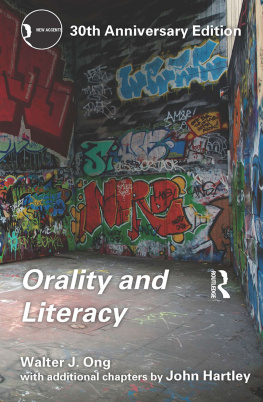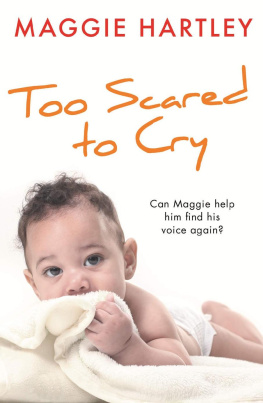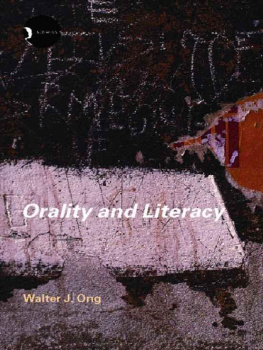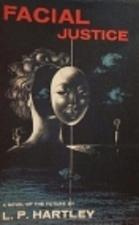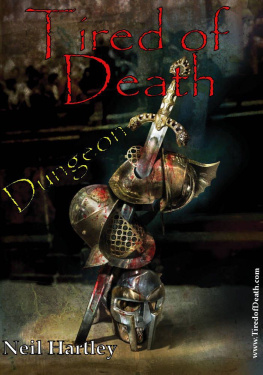Hartley John - Orality and literacy: the technologizing of the word
Here you can read online Hartley John - Orality and literacy: the technologizing of the word full text of the book (entire story) in english for free. Download pdf and epub, get meaning, cover and reviews about this ebook. City: New York, year: 2013, publisher: Routledge, genre: Religion. Description of the work, (preface) as well as reviews are available. Best literature library LitArk.com created for fans of good reading and offers a wide selection of genres:
Romance novel
Science fiction
Adventure
Detective
Science
History
Home and family
Prose
Art
Politics
Computer
Non-fiction
Religion
Business
Children
Humor
Choose a favorite category and find really read worthwhile books. Enjoy immersion in the world of imagination, feel the emotions of the characters or learn something new for yourself, make an fascinating discovery.
- Book:Orality and literacy: the technologizing of the word
- Author:
- Publisher:Routledge
- Genre:
- Year:2013
- City:New York
- Rating:4 / 5
- Favourites:Add to favourites
- Your mark:
- 80
- 1
- 2
- 3
- 4
- 5
Orality and literacy: the technologizing of the word: summary, description and annotation
We offer to read an annotation, description, summary or preface (depends on what the author of the book "Orality and literacy: the technologizing of the word" wrote himself). If you haven't found the necessary information about the book — write in the comments, we will try to find it.
Orality and literacy: the technologizing of the word — read online for free the complete book (whole text) full work
Below is the text of the book, divided by pages. System saving the place of the last page read, allows you to conveniently read the book "Orality and literacy: the technologizing of the word" online for free, without having to search again every time where you left off. Put a bookmark, and you can go to the page where you finished reading at any time.
Font size:
Interval:
Bookmark:
Walter J. Ongs classic work provides a fascinating insight into the social effects of oral, written, printed and electronic technologies, and their impact on philosophical, theological, scientific and literary thought.
This thirtieth anniversary edition coinciding with Ongs centenary year reproduces his best-known and most influential book in full and brings it up to date with two new exploratory essays by cultural writer and critic John Hartley.
Hartley provides:
- a scene-setting chapter that situates Ongs work within the historical and disciplinary context of post-war Americanism and the rise of communication and media studies
- a closing chapter that follows up Ongs work on orality and literacy in relation to evolving media forms, with a discussion of recent criticisms of Ongs approach, and an assessment of his concept of the evolution of consciousness
- extensive references to recent scholarship on orality, literacy and the study of knowledge technologies, tracing changes in how we know what we know.
These illuminating essays contextualize Ong within recent intellectual history and display his works continuing force in the ongoing study of the relationship between literature and the media, as well as that of psychology, education and sociological thought.
Walter J. Ong (November 30 1912August 12 2003) was University Professor Emeritus at Saint Louis University, USA, where he was previously Professor of English and Professor of Humanities in Psychiatry. His many publications have been highly influential for studies in the evolution of consciousness.
John Hartley is an educator, author, researcher and commentator on the history and cultural impact of television, journalism, popular media and creative industries. He is Professor of Cultural Science and Director of the Centre for Culture and Technology at Curtin University, Western Australia.
Alternative Shakespeares ed. John Drakakis
Alternative Shakespeares: Volume 2 ed. Terence Hawkes
Critical Practice Catherine Belsey
Deconstruction: Theory and Practice Christopher Norris
Dialogue and Difference: English for the Nineties ed. Peter Brooker and Peter Humm
The Empire Writes Back: Theory and Practice in Post-Colonial Literature Bill Ashcroft, Gareth Griffiths and Helen Tiffin
Fantasy: The Literature of Subversion Rosemary Jackson
Dialogism: Bakhtin and his World Michael Holquist
Formalism and Marxism Tony Bennett
Making a Difference: Feminist Literary Criticism ed. Gayle Green and Copplia Kahn
Metafiction: The Theory and Practice of Self-Conscious Fiction Patricia Waugh
Narrative Fiction: Contemporary Poetics Shlomith Rimmon-Kenan
Orality and Literacy: The Technologizing of the Word Walter J. Ong
The Politics of Postmodernism Linda Hutcheon
Post-Colonial Shakespeares ed. Ania Loomba and Martin Orkin
Reading Television John Fiske and John Hartley
The Semiotics of Theatre and Drama Keir Elam
Sexual/Textual Politics: Feminist Literary Theory Toril Moi
Structuralism and Semiotics Terence Hawkes
Studying British Cultures: An Introduction ed. Susan Bassnett
Subculture: The Meaning of Style Dick Hebdige
Telling Stories: A Theoretical Analysis of Narrative Fiction Steven Cohan and Linda M. Shires
Translation Studies Susan Bassnett
First published in 1982 by Methuen & Co. Ltd
New edition published 2002 by Routledge
This 30th anniversary edition published 2012 by Routledge
Published 2015 by Routledge
2 Park Square, Milton Park, Abingdon, Oxon OX14 4RN
Simultaneously published in the USA and Canada by Routledge
711 Third Avenue, New York, NY 10017 USA
Routledge is an imprint of the Taylor & Francis Group, an informa business
1982, 2002 Walter J. Ong; selected content 2012 John Hartley
The right of Walter J. Ong and John Hartley to be identified as authors ofthis work has been asserted by them in accordance with sections 77 and 78 of the Copyright, Designs and Patents Act 1988.
All rights reserved. No part of this book may be reprinted or reproduced or utilized in any form or by any electronic, mechanical, or other means, now known or hereafter invented, including photocopying and recording, or in any information storage or retrieval system, without permission in writing from the publishers.
Trademark Notice :Product or corporate names may be trademarks or registered trademarks, and are used only for identification and explanation without intent to infringe.
British Library Cataloguing in Publication Data A catalogue record for this book is available from the British Library
Library of Congress Cataloging in Publication Data Ong, Walter J.
Orality and literacy : the technologizing of the word / Walter J. Ong,
with additional chapters by John Hartley.
p. cm. (30th anniversary ed.) (3rd ed.)
Includes bibliographical references and indexes.
1. Language and culture. 2. Oral tradition. 3. Writing. 4. Written communication.
I. Hartley, John, 1948- II. Title.
P35.O5 2013
306.44dc23
2012005539
ISBN 9780415538374 (hbk)
ISBN 9780415538381 (pbk)
ISBN 9780203103258 (ebk)
Typeset in Joanna
by Refine Catch Limited, Bungay, Suffolk
(i) (ii) (iii) (iv) (v) (vi) (vii) (viii) (ix) | |
(i) (ii) (iii) (iv) | |
No doubt a third General Editors Preface to New Accents seems hard to justify. What is there left to say? Twenty-five years ago, the series began with a very clear purpose. Its major concern was the newly perplexed world of academic literary studies, where hectic monsters called Theory, Linguistics and Politics ranged. In particular, it aimed itself at those undergraduates or beginning postgraduate students who were either learning to come to terms with the new developments or were being sternly warned against them.
New Accents deliberately took sides. Thus the first Preface spoke darkly, in 1977, of a time of rapid and radical social change, of the erosion of the assumptions and presuppositions central to the study of literature. Modes and categories inherited from the past it announced, no longer seem to fit the reality experienced by a new generation. The aim of each volume would be to encourage rather than resist the process of change by combining nuts-and-bolts exposition of new ideas with clear and detailed explanation of related conceptual developments. If mystification (or downright demonization) was the enemy, lucidity (with a nod to the compromises inevitably at stake there) became a friend. If a distinctive discourse of the future beckoned, we wanted at least to be able to understand it.
With the apocalypse duly noted, the second Preface proceeded piously to fret over the nature of whatever rough beast might stagger portentously from the rubble. How can we recognise or deal with the new?, it complained, reporting nevertheless the dismaying advance of a host of barely respectable activities for which we have no reassuring names and promising a programme of wary surveillance at the boundaries of the precedented and at the limit of the thinkable. Its conclusion, the unthinkable, after all, is that which covertly shapes our thoughts may rank as a truism. But in so far as it offered some sort of useable purchase on a world of crumbling certainties, it is not to be blushed for.
Font size:
Interval:
Bookmark:
Similar books «Orality and literacy: the technologizing of the word»
Look at similar books to Orality and literacy: the technologizing of the word. We have selected literature similar in name and meaning in the hope of providing readers with more options to find new, interesting, not yet read works.
Discussion, reviews of the book Orality and literacy: the technologizing of the word and just readers' own opinions. Leave your comments, write what you think about the work, its meaning or the main characters. Specify what exactly you liked and what you didn't like, and why you think so.

